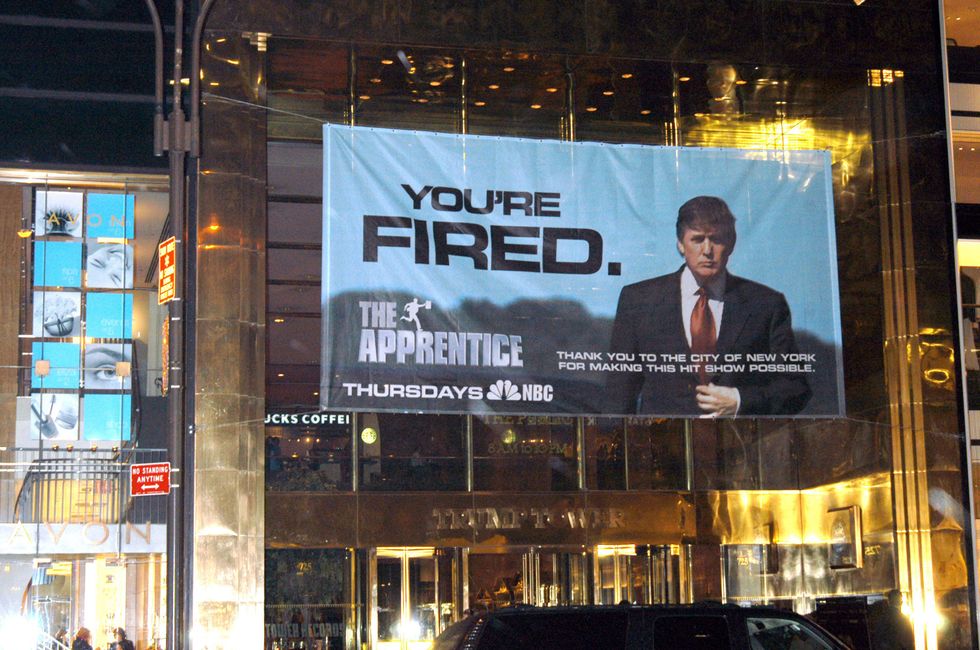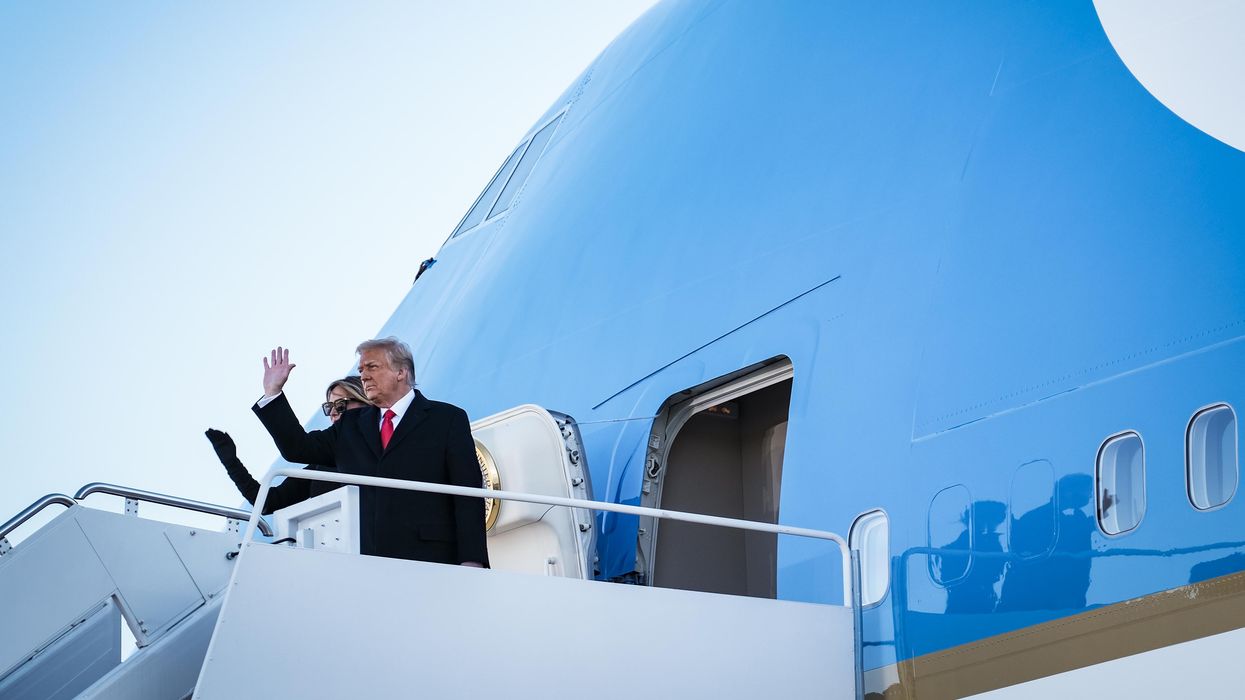As Donald Trump's brazenly chaotic and exhausting presidency comes to an end, he leaves behind this fundamental question:
Did his relentless attacks on our democracy make its festering problems even more malignant than he found them? Or did his unstoppable assault on civic institutions and governing norms succeed in highlighting the system's fragility while also tempering its resilience?
The nation's collective behavior in the years ahead will determine whether American democracy's metaphorical glass has been irreparably emptied or has a sufficient reservoir for survival. For now, the 45th president's infuriated yielding of power on Wednesday allows for a quick countdown of seven ways he rattled the republic the most. Such inventories are a necessary first step for those dedicated to fixing the system — so the next four years under Joe Biden don't come close to replicating the stress and anxiety of the Trump era.
7. He exposed the limits of governing without experience.
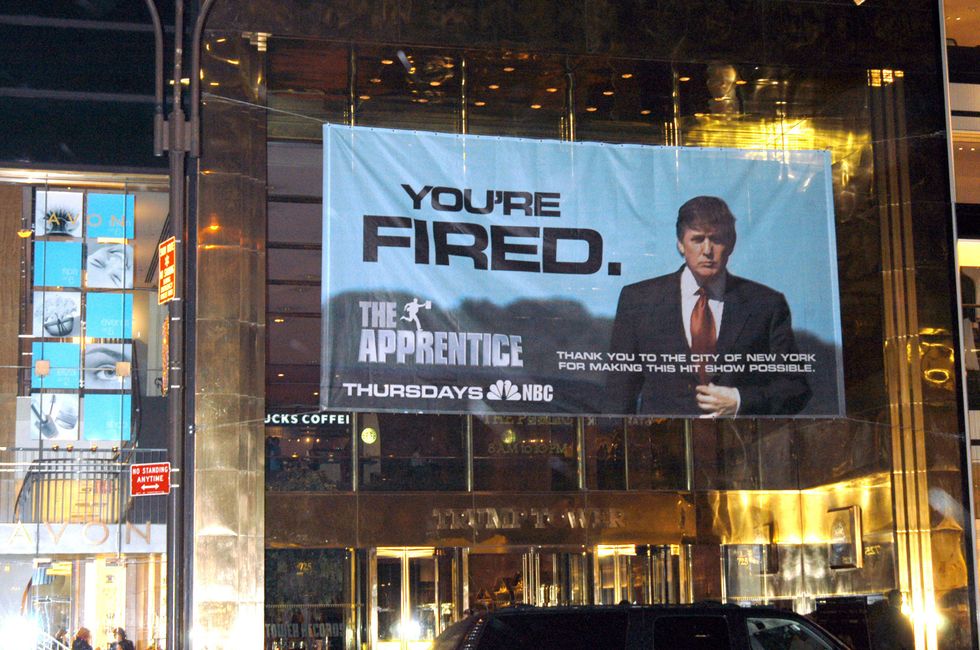
Ron Galella/Getty Images
Commander-in-chief is the only position of public trust Trump ever sought — or held. A real estate promoter and reality television star, he had never so much as served on a small-town zoning board until Jan. 20, 2017. All of his 44 predecessors had been leaders in federal or state government: governors, members of Congress, generals or Cabinet secretaries.
Fans saw his unique measure of inexperience as a badge or honor for the ultimate outsider committed to dismantling business as usual. But skeptics worried his total lack of familiarity with how governments operate, both mechanically and ethically, would be a debilitating if not dangerous liability.
At the start, much of Trump's norm-busting behavior and disregard for the rule of law came off as a form of willful ignorance that was a part of his unique brand of political theatrics.
But even Republican allies soon found themselves ascribing his most perplexing and outrageous conduct to someone "still growing" into the presidency's awesome requirements and limits. It was an excuse many kept citing almost to an end marked by his mismanagement of a crippling pandemic and the violence that flowed from his refusal to accept defeat. Those miseries, fueled by his inabilities on the job, will be more prominent parts of his legacy than the achievements for which he claims credit: installing three Supreme Court justices and 54 appeals court judges, pushing a substantial tax cut through Congress, and engineering expansive business and environmental deregulation.
6. He propelled political spending to unseen heights.
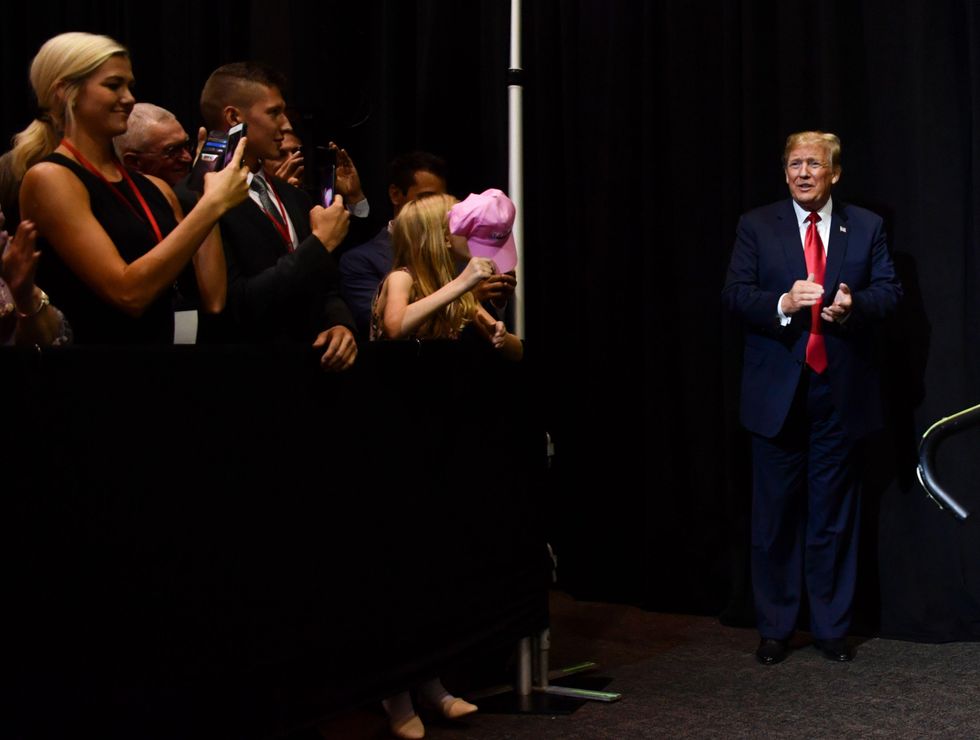
President Trump attends a 2018 fundraiser in South Dakota.
Nicholas Kamm/AFP via Getty Images
Trump claimed the White House in the second presidential election after the Supreme Court's landmark Citizens United decision effectively unlocked the last meaningful shackles impeding the flow of money in politics. He claimed to have spent $66 million of his own money, smashing the record for self-funding by a national candidate, and the grand total for candidate and outside group spending on presidential and congressional races topped $7 billion for the first time.
Four years later, those numbers seem almost quaint. The enormous potential business consequences from Trump's reelection or defeat combined with the political passions of millions of Americans — at all income levels and all along the ideological spectrum — pushed the campaign finance system into overdrive.
Two billionaires, Michael Bloomberg and Tom Steyer, each tapped many multiples of their fortunes more than Trump but gave up near the Democratic primary's starting gate.
More importantly, spending on all federal elections more than doubled, cresting $14 billion for 2020 — the size of West Virginia's budget, Instagram's revenue and Amazon's projected profit for the year. That was because small-dollar donations, contributions by business super PACs, and money from outside groups backed by billionaire donors and closely tied "dark money" groups all went through the roof.
Trump did not single handedly cause the cavalcade of cash, but neither did he make any effort to slow it or assure its minimal regulation was carried out. Most seats on the already weakened and gridlocked Federal Election Commission were kept vacant until the end of his presidency. Only at that point came Trump's unintended but potentially biggest contribution to the cause of campaign finance reform: the wave of companies closing their checkbooks indefinitely to Republicans who backed Trump's effort to overturn the election.
5. He toppled the boundaries of civil discourse.
The presidential bully pulpit has the ability to shape the national conversion, and Trump did so with a tone that was consistently hyperbolic, defiant, uncompromising — and largely free of facts. Civic educators, parents and politicians all agree his rhetorical legacy is making it more difficult for Americans to bridge their differences through conversation.
His pronouncements bore all the hallmarks of demagogues and autocrats, focused on delegitimizing all criticism and maintaining the allegiance of his loyalists. And his refusal to reflect subtlety or countenance compromise had a profound effect on magnifying the polarization of politics. Nuance is almost impossible in 280 characters, a point Trump underscored in the more than 60,000 tweets and retweets before both Twitter and Facebook locked him out this month. But in short bursts or meandering ramblings at rallies, Trump made little time for the truth: Fact checkers have come up with 30,000 as the consensus total of his presidential lies and falsehoods.
The only oddly saving grace was that his social media addiction and love of speechmaking produced a new sort of government transparency. Salted amid all the disinformation was a steady diet of policy pronouncements, personnel moves, shifting views and flat reversals — along with stream-of-consciousness insights into the complex mindset of the world's most powerful person.
4. He succeeded in expanding the swamp he vowed to empty.
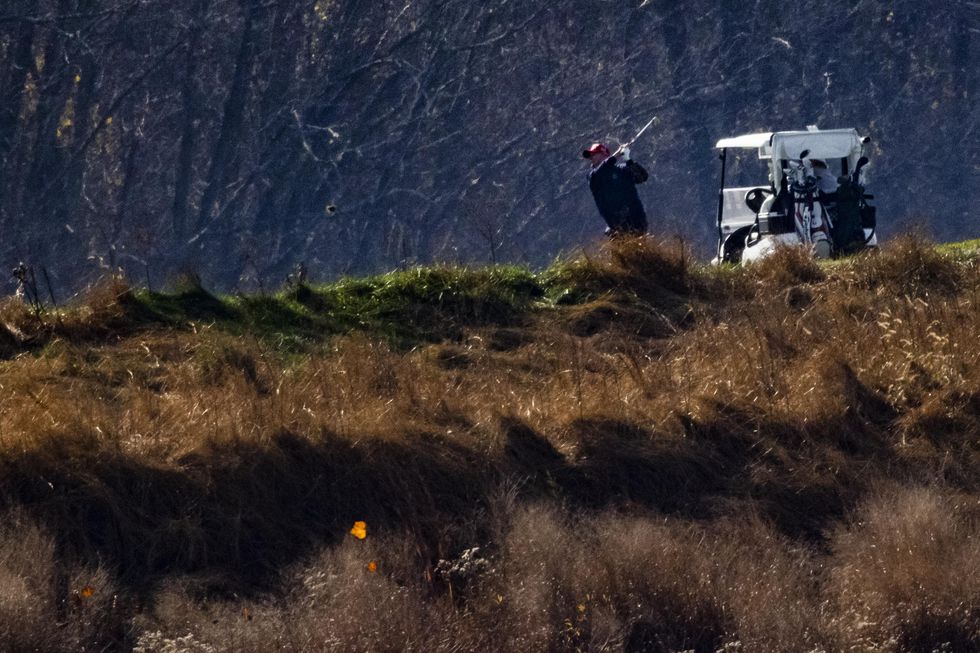
President Trump plays a round of golf at his Virginia course in November.
Samuel Corum/Getty Images
If one aspect of Trump's 2016 candidacy made democracy reformers happy, it was his repeated vow to "drain the swamp." But his disregard for that campaign pledge went way beyond shelving his own plans for tightening lobbying regulation, limiting campaign donations from foreign companies and setting congressional term limits.
Instead, he personally led an unprecedented presidential enhancement of influence for well-heeled private interests — starting with his own. The rasher of pardons at the end of his term, larded with clemency for his own political allies and favor-doers, was only the final example after four years of special and sometimes lucrative treatment for the people and institutions in his familial, financial, social and political orbits.
The government was compelled to spend millions at Trump's properties — the golf courses where he played most weekends, the D.C. hotel that became a de facto Oval Office waiting room, the Florida resort he made his weekend White House and the hotels around the world where his family stayed. His eponymous real estate business kept pursuing deals with both American allies and adversaries. He sidestepped anti-nepotism rules so his son-in-law Jared Kushner could have a top West Wing post. He used his office to promote companies run by supporters and to steer federal contracts and other government business to allies.
Beyond that, he named former lobbyists and corporate executives to jobs with oversight of the industries of their former clients, and four of "only the best people" in his original Cabinet were forced out under ethical clouds. He went to the Supreme Court to preserve, at least for his time in office, his distinction as the first president since the 1970s to keep his tax returns a secret.
Finally, on his last night in the Oval Office, he revoked an executive order, signed days after he took office, that had stopped his appointees' from spinning through the revolving door to lobby for five years after leaving the administration.
3. He sought to obliterate the balance of power.
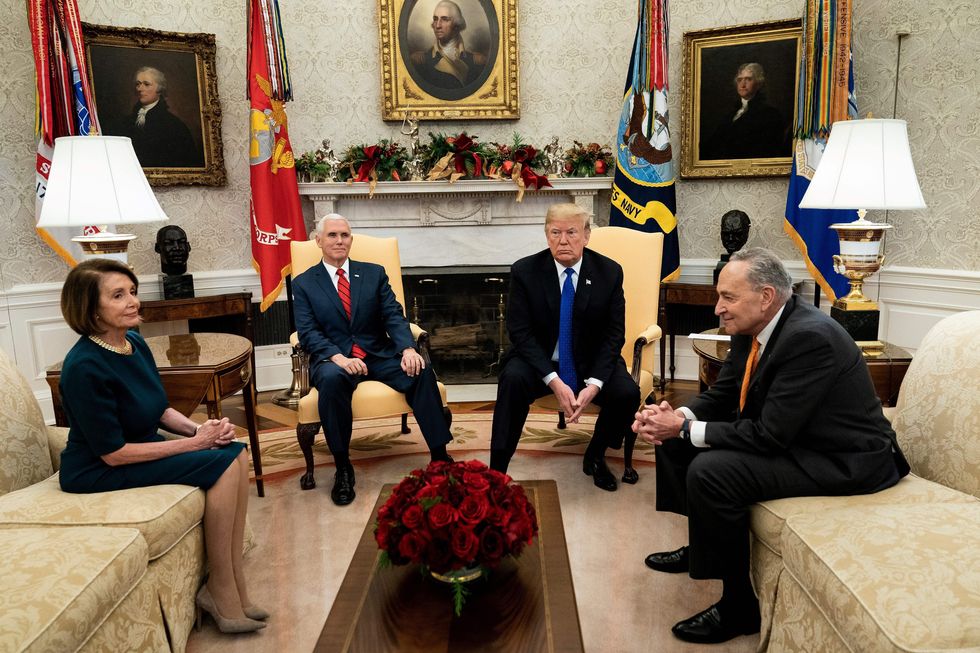
President Trump meets with Democratic congressional leaders in December 2018.
Brendan Smialowski/AFP via Getty Images
While intermittently attacking the independence of the federal judiciary, and more frequently the integrity and importance of a free press, Trump has reserved a special measure of substantive scorn for the powers and prerogatives of Congress. And the legislative branch — mostly under the control of Republicans the past four years and dysfunctional to the point of paralysis in any case — has essentially permitted itself to get bowled over by all the stiff arms.
All presidents have sought to recalibrate the system of checks and balances to the favor of executive power and the disadvantage of those who write the laws and conduct government oversight. But Trump stands out as the most aggressive and assertive in modern times. He invoked rarely used emergency powers to execute plans (construction of his border wall, most famously) that Congress explicitly rejected. He used money Congress appropriated for specific projects and spent it instead on proposals lawmakers rebuffed. He threatened government whistleblowers who revealed untoward administration behavior and dismissed inspectors general who did likewise, violating rules designed to protect their honesty and independence.
Most notably, perhaps, he consistently ordered his administration to slow-walk, challenge in court or flatly ignore congressional subpoenas — on matters ranging from the bureaucratically arcane to the underpinnings of Trump's first impeachment.
The silver lining here is that Democrats newly in charge on Capitol Hill have prepared a comprehensive package to realign the balance of power, even with Biden in the White House. And because the new president is a Democrat (and their own authority is on the line), Republicans may be willing to give the package a bipartisan stamp of approval.
2. He sowed unmatched distrust in the electoral system.
No other president has done so much to incubate distrust in the elemental acts of American democracy — the casting and tabulating of ballots for public office.
But the public consciousness is now saturated with Trump's more recent and even more insidious unprecedented assault on democracy, working to reverse the election he lost even to the point of fomenting a mob attack on the Capitol. And so his remarkable effort to undermine the electorate's faith in the security and reliability of voting has slipped to secondary consequence.
That campaign began seven months before Election Day, perversely a part of his effort to simultaneously leverage and downplay national anxiety about how the burgeoning coronavirus was going to upend every aspect of American life.
"Mail ballots are a very dangerous thing for this country, because they're cheaters," he told reporters at a briefing April 7. "There's a lot of dishonesty going along with mail-in voting."
It was the first of more than 150 false or misleading claims, catalogued by the Washington Post during the campaign, concerning fraudulent ballots or the alleged dangers of absentee voting — inconsistently focused on states that proactively deliver vote-by-mail packets to all registered voters. And that does not include the burst of wholly inaccurate claims in the summer that he had the power to postpone the election if he decided unilaterally it was not going to be on the up-and-up.
The crusade ended up backfiring. Either because of political pressure or as a consequence of the most litigated election ever, two-thirds of states made it easier to cast a ballot in 2020, mostly by making it easier to vote by mail. By highlighting the states' control and other aspects of the election system that generally get overlooked, Trump ended up ensuring the public was better informed than ever about voting mechanics.
That, and Trump's polarizing nature, prompted 67 percent of those eligible to cast a ballot — the highest turnout in 120 years. Two-fifths of the votes came in envelopes, up from one-quarter in the previous two elections. There was no evidence of widespread fraud or irregularities, prompting Trump's own administration to declare it the most secure election in history. And, ultimately, the president's own strategy worked decisively against him by producing a "red mirage" on election night: His dominance of that day's volume at the polls disappeared when mailed votes were counted and went decisively for Biden, the candidate who did not declare them untrustworthy.
1. He fomented an insurrection against his government.
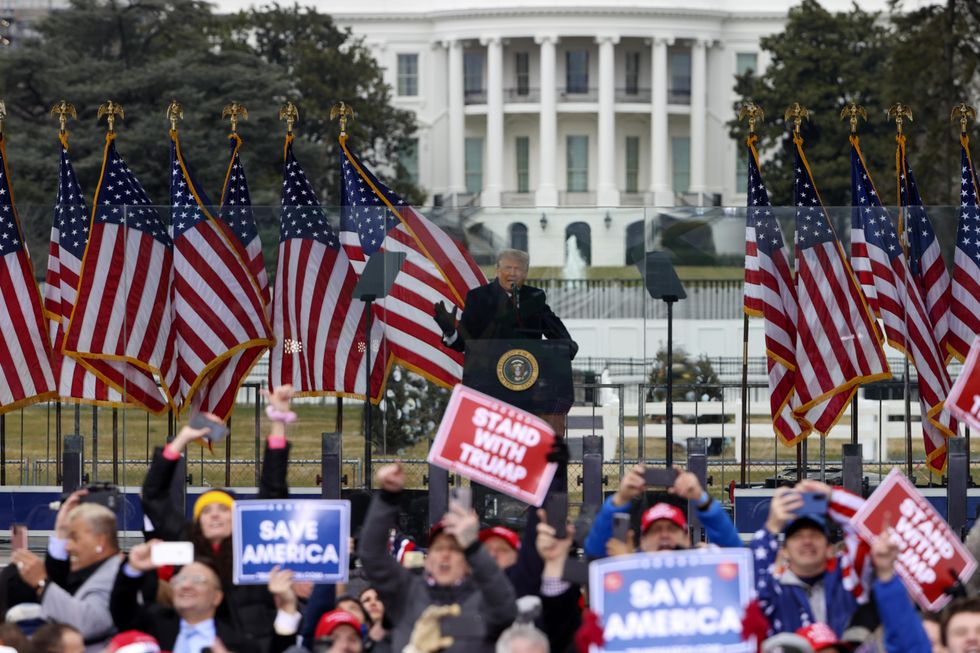
President Trump rallies his supporters before they storm the Capitol on Jan. 6.
Tasos Katopodis/Getty Images
No other president has been impeached twice, and Trump would not have been — and just a week before leaving office — but for the shocking seriousness and palpable validity of the alleged offense. The Senate will soon try him on the House's charge of "inciting violence against the government of the United States" in his quest to overturn Biden's election.
Whether formally convicted or not, and then barred from seeking the presidency again, on his last full day in office he heard Senate Republican Leader Mitch McConnell affix the blame for the storming of the Capitol on Jan. 6. "The mob was fed lies," he said. "They were provoked by the president."
The damage and injury wrought by the thousands of violent insurrectionists who heard his rhetoric that day as a call to arms, to disrupt the tabulating of the Electoral College results that sealed his defeat, will almost certainly stand as the most tangible evidence of his assault-on-democracy-itself legacy. The memory has been lastingly seared on the global consciousness.
The riot was quelled and the election result was finalized — albeit with two out of three House Republicans, and one in six GOP senators, voting with the ousted president and against the election that ousted him.
So does Wednesday's inauguration — a peaceful transfer of power, perhaps, only because 25,000 troops are belatedly standing guard — mean democracy has survived or only that its fragility has been magnified? Are the politicians' fresh declarations after the riot — "This is not who we are" because "We are better than this" — viable exhortations for a recommitment to longstanding virtues or only naive bromides about a past that has rarely been as venerable as described?
Probably it means the system has proved itself both resilient and more threadbare than ever before.
